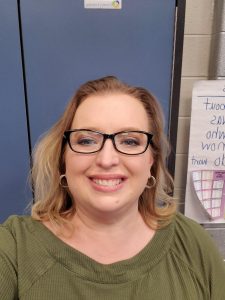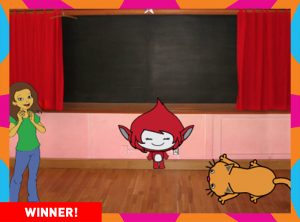 TEACHER: Misty May
TEACHER: Misty May
DETROIT: Detroit
SCHOOL: Brenda Scott Academy
SUBJECT AREA: STEM, Multimedia Production Arts
YEARS PARTICIPATED IN THE PROGRAM: 2
Misty May is a 2-year Student Challenge cohort teacher hailing from the ‘Motor City.’ Last year, Misty’s students at Brenda Scott Academy participated in the last in-person G4C game jam of 2020, just weeks before schools across the country made the transition to remote and hybrid learning. Misty was the recipient of the Detroit Leadership Award for her outstanding dedication to teaching and involvement in the 2020 Student Challenge (see her acceptance video on the Student Challenge YouTube channel).
We spoke with Misty about her experiences bringing game design into her STEM classroom and how she is navigating the challenges of remote teaching in a city where 70% of school-aged children are without access to internet connection at home. (source)
Q: Are you a gamer?
A: I’m not a gamer, so when I first saw the Challenge I was like “Er, I don’t know if I want to do this.” My husband and daughter are huge gamers. When she was younger she would try to get me to play Minecraft with her and I would constantly look down at the controller because I would always forget which key to press.
Q: What kind of environment do you strive to create in your classroom?
A: I want to keep my classroom first and foremost positive, open, and safe. I want the kids that come in to know that they can be confident in themselves and not be afraid to make mistakes. That’s what I’ve been pushing and this program really helps with that. They can be unafraid to make mistakes and try something new.
Q: What made you decide to join the G4C Student Challenge?
A: I don’t remember how I first heard about it – I think I got an email invitation. And then I just visited the website. I thought it would be a good opportunity to get more of my kids interested in coding. We had done the basics with Code.org but I wanted to dig deeper into it. I thought maybe it would give some kids who didn’t see themselves as coders a chance to experience that.
Q: What skills do you think students are building through the Challenge?
A: I know hands down probably the biggest one right now, especially through the pandemic, is time management. That is probably the hardest skill to teach but I think this has actually helped. Having their classes, then having something else to do like the Challenge makes them have to learn how to focus the amount of time they spend on certain tasks. So, hands down, time management.
Q: What types of challenges are you facing with virtual/hybrid learning?
A: The biggest thing for me right now is keeping the students engaged. Between spotty Internet connections and broken technology, and, if they’re in a team, keeping them together. This year I’ve pushed siblings together…Work with who you have there is what I’m pushing. And I think once we get back to school the challenge will be distractions. They’ll be back together and they’ll want to do some of those things that they haven’t been able to do. They may lose a little focus. But I still hope we get back together in person!
Q: What are some tricks you’ve used to help keep students engaged?
A: I send them a whole lot of messages. What I’ve been doing now is meet with them outside of class time. Because my STEM classes are pretty much spent tracking kids down. Getting them to come into class. And then a lot of them are in STEM because they have to be in a class. I’ll share the basics, but after that, we started using breakout rooms in Teams so that kids who are doing game design can go do it.
Q: What kind of hardware are students working on?
A: Last year, through a partnership with several community partners, they secured tablets and 6 months of free wifi. The issue being students started picking them up in July and they’re running out of that free wifi now. And if their device broke, they were responsible for getting them fixed. Now we’re on to opening up learning hubs so if students have a broken device they can get them fixed, or get loner devices. But a lot of my kids, especially middle school level, are working on smartphones. It’s challenging.
Q: Tell us about one of your students’ success stories
A: I think probably the best example I can think of was my three 5th grade girls last year who submitted a game. When the pandemic hit, being that I’m in Detroit, we’re talking about a city with maybe 50% of its population having access to the Internet, to wifi, to tech. When everything shut down in March we were not prepared to deal with that.
There were a lot of phone calls made on my end and on my school’s end. I reached out to those three girls and said, “Hey, we can still do this.” And to me, just the fact that they finished their game was the biggest success of all. And I know that without the game jam day that you guys came and did last year…they wouldn’t have finished. They didn’t even have an idea before that of what they were going to do.
Q: What has been the most surprising thing about teaching the program?
A: I wasn’t expecting to enjoy it so much, being that I don’t come from a big gaming background. And I was really shocked by the ease of use of Scratch. At first, I thought it was hard, but then I started watching the tutorials and getting into it. I was like “I can do this.” And if I can do this, my gaming kids can do this.
It was all new to me. I don’t code a lot. I know some of my kids do. At first, when you have the kids look at the code that some other kid made and they see all those lines of code…the kids say “I can’t do that.” And I tell them they can remix it. That feature there saved me. It’s awesome.
Q: Do you have any advice for other teachers?
A: I would say, even if you’re not a gamer, you can do this. Even if you’re not super techy you can do this. Tutorials are great. The Scratch platform is really user-friendly. Give it a try!
Play the winning game created by three of Misty May’s students for the 2020 G4C Student Challenge competition!

Rock, Paper, Scissors 2020 Middle School Winner The Human-Animal Bond Cheer on Nano and Tera as they battle it out to be the rock, paper, scissors champion, proving the ultimate human-animal friendship.

